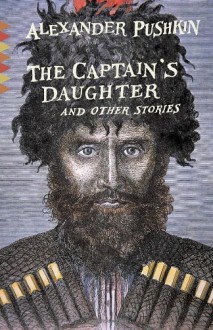
There’s a little sense of dissonance when I read a classic and my response is “huh, okay.” This is especially true when I read the classic in translation; in this case, the translation is very smooth, contemporary, and easy to read, which causes its own form of dissonance. These now feel like contemporary stories rather than something written in the early 19th century, and compared to contemporary stories they don’t particularly stand out to me, but then I neither read them in their original language nor am familiar with the history of Russian literature so as to appreciate the ways in which Pushkin was blazing a new trail.
The stories:
“The Captain’s Daughter”: This novella occupies almost half of the book. It involves a romance between a young officer and the angelic daughter of the captain, set during the time of Pugachev’s rebellion, and Pugachev himself is the most vibrant character in it. The story moves along briskly and is fairly satisfying, though the characters are not particularly complex. This edition also includes an omitted chapter, which is interesting in that Pushkin ditched a bunch of melodrama and overt paternalism.
“The Tales of Ivan Petrovich Belkin”: These five stories, mostly around 15 pages each, are given a framing device in that they were all collected by a fictional young dead man, but they aren’t actually linked, so I’ll discuss them separately.
“The Shot”: The narrator pieces together the story of a multi-episode duel from others. It’s a bleak world in which men are expected to kill and die in duels over the most mundane insults, and those who refuse lose all respect from their fellows. (Pushkin, sadly, died himself in a duel at age 37.)
“The Snowstorm”: A prank disrupts a love affair. This is a cleverly structured story, in which after reading the end you go back and read over the earlier parts with fresh eyes, something I love in a short story. It made me uncomfortable in that I didn’t find Burmin’s behavior deserving of a happy ending.
“The Undertaker”: A man has ungenerous thoughts and is punished with a nightmare. Um, okay.
“The Postmaster”: Another narrator piecing together someone else’s story, this time of a postmaster and his prodigal daughter. This didn’t do much for me.
“Mistress Into Maid”: A sweet little story about a forbidden romance, also involving some pranking, but this time harmless. I enjoyed this one.
“The Queen of Spades”: This is a somewhat longer story about gambling and obsession, in which a calculating young man will go to almost any length for a guaranteed win at cards. I found this one pretty good and with a satisfying ending.
“Kirdjali”: Eight pages about the legend of an Eastern European bandit. Okay.
“The Negro of Peter the Great”: This is an unfinished fragment, around 40 pages long, of what was perhaps intended to be a novel. The title isn’t politically correct these days but the “Negro” in question is a (lightly fictionalized?) version of Pushkin’s own maternal great-grandfather, Abram or Ibrahim Gannibal, who was brought to Russia as a boy, adopted by Peter the Great as his godson, sent to France to study military engineering, and later returned to Russia to be an important figure in the military and the court. The fragment deals largely with Ibrahim’s love troubles, as well as his relationship with Peter the Great, who’s presented in a very positive light. This is interesting from a historical perspective though a fragment is unlikely to satisfy in a storytelling sense.
Overall, I’m glad to have read some work by a classic author I hadn’t been exposed to before, and appreciated the window into 18th and early 19th century Russia. But while the writing is perfectly fine, I can’t say any of it blew me away. I also have the sense that this collection doesn’t represent Pushkin’s best work, much of which was poetry and plays.

 Log in with Facebook
Log in with Facebook 









